|
|
|
Sort Order |
|
|
|
Items / Page
|
|
|
|
|
|
|
| Srl | Item |
| 1 |
ID:
107064
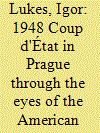

|
|
|
|
|
| Publication |
2011.
|
| Summary/Abstract |
This article examines the dramatic events that transformed Czechoslovakia into a totalitarian dictatorship primarily from the perspective of the United States Foreign Service officers posted at the American Embassy in Prague. It is based on new archival sources, on interviews with former American Foreign Service and Intelligence officers, and on their unpublished mémoires.
|
|
|
|
|
|
|
|
|
|
|
|
|
|
|
|
| 2 |
ID:
095091
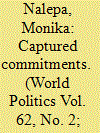

|
|
|
|
|
| Publication |
2010.
|
| Summary/Abstract |
How can outgoing autocrats enforce promises of amnesty once they have left power? Why would incoming opposition parties honor their prior promises of amnesty once they have assumed power and face no independent mechanisms of enforcement? In 1989 autocrats in a number of communist countries offered their respective oppositions free elections in exchange for promises of amnesty. The communists' decision appears irrational given the lack of institutions to enforce these promises of amnesty. What is further puzzling is that the former opposition parties that won elections in many countries actually refrained from implementing transitional justice measures. Their decision to honoring their prior agreements to grant amnesty seems as irrational as the autocrats' decisions to place themselves at the mercy of their opponents. Using an analytic narrative approach, the author explains this paradox by modeling pacted transitions not as simple commitment problems but as games of incomplete information where the uninformed party has "skeletons in its closet"-that is,embarrassing information that provides insurance against the commitments being broken. The author identifies the conditions under which autocrats step down even though they can be punished with transitional justice and illustrates the results with case studies from Czechoslovakia, Poland, and Hungary.
|
|
|
|
|
|
|
|
|
|
|
|
|
|
|
|
| 3 |
ID:
107707
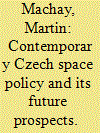

|
|
|
| 4 |
ID:
123837
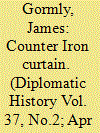

|
|
|
|
|
| Publication |
2013.
|
| Summary/Abstract |
American aviation relations with the Soviet Union and Eastern Europe followed an almost a predicable path. Initially, there was optimism that the Soviets would join the West in a system of international aviation. This matched the needs of an expanding aviation industry and the hopes of continuing East-West cooperation. But, continued Soviet refusal to open its air space and the developing cold war encouraged Washington to focus its efforts on Eastern Europe, seeing it as a means to maintain a wedge in the Iron Curtain. But by mid-1948 events in Czechoslovakia produced a new approach, the isolation of Soviet and Eastern bloc aviation behind the Iron Curtain. Convincing Western European nations to agree was like herding cats, but most grudgingly complied. The "success" of the "counter iron curtain" lasted until the mid-1950s, when changes in Soviet aviation policy lured most European nations away from U.S. policy. As governments flocked to Moscow jockeying for air routes, Washington's goal of isolation collapsed, leaving its policy a captive of the Cold War until 1967.
|
|
|
|
|
|
|
|
|
|
|
|
|
|
|
|
| 5 |
ID:
013940
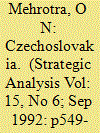

|
|
|
|
|
| Publication |
Sept 1992.
|
| Description |
549-559
|
|
|
|
|
|
|
|
|
|
|
|
|
|
|
|
| 6 |
ID:
183369
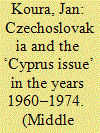

|
|
|
|
|
| Summary/Abstract |
This study is based on a broad range of newly declassified documents which garner revelatory findings pertaining to the involvement of Czechoslovakia in the Cyprus dispute in the years 1960–1974. These new findings reveal that the countries of the Eastern Bloc sought to prevent the overthrow of the Cypriot President Makarios during the studied period, as his foreign policy ensured that the island would not become a NATO base against allied Arab countries in the Middle East. Czechoslovakia played a considerable role in keeping Makarios in power by arms deliveries (some of them hitherto unknown), which allowed him to build up the special police forces to counterweight the National Guard controlled by Greece and face attempts of the Greek junta to overthrow him. Additionally, this article analyses activities of Czechoslovak intelligence on the island which managed to obtain valuable information on the politically unstable Eastern Mediterranean and Middle East from the inner circle of President Makarios. Czechoslovak intelligence, contrary to the Ministry of Foreign Affairs, backed weapon sales to Cyprus and supported the island’s non-alignment policy because these guaranteed a steady supply of valuable intelligence on the entire Middle East.
|
|
|
|
|
|
|
|
|
|
|
|
|
|
|
|
| 7 |
ID:
044731
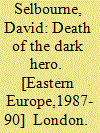

|
|
|
|
|
| Publication |
London, Jonathan Cape, 1990.
|
| Description |
xiii, 274p.Hbk
|
| Standard Number |
0224027921
|
|
|
|
|
|
|
|
|
|
|
|
Copies: C:1/I:0,R:0,Q:0
Circulation
| Accession# | Call# | Current Location | Status | Policy | Location |
| 032343 | 947/SEL 032343 | Main | On Shelf | General | |
|
|
|
|
| 8 |
ID:
190430
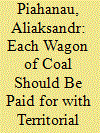

|
|
|
|
|
| Summary/Abstract |
Even a short breakdown in fuel supplies can have profound and dramatic consequences for modern economies. This paper explores a major coal shortage in Central Europe after WWI which shook local societies for two years. The dissolution of the Habsburg Empire in 1918 provides a narrower context to this study, while its immediate focus lies upon the development of diplomatic and economic relationships between Czechoslovakia – a WWI victor and an important coal exporter, and Hungary – a war losing state that was a net coal importer. This paper underlines the scale of the Hungarian reliance on fuels from Czechoslovakia, and suggests that this dependency was one of the chief arguments that motivated Budapest to cede Slovakia to Prague’s control and, more generally, to accept the peace terms proposed at the Paris conference. It is safe to conclude that economic considerations played a much greater, if not dominant, role in the adoption of the peace treaty of Trianon of 1920 in Hungary. Overall, the paper demonstrates that cross-border energy interdependence substantially influenced diplomatic relations in Central Europe immediately after WWI, privileging coal-exporting states over coal-importing states.
|
|
|
|
|
|
|
|
|
|
|
|
|
|
|
|
| 9 |
ID:
140894
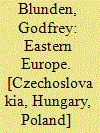

|
|
|
|
|
| Publication |
Nederland, Time-Life international, 1966.
|
| Description |
176p.: ill.hbk
|
|
|
|
|
|
|
|
|
|
|
|
Copies: C:1/I:0,R:0,Q:0
Circulation
| Accession# | Call# | Current Location | Status | Policy | Location |
| 000430 | 947/BLU 000430 | Main | On Shelf | General | |
|
|
|
|
| 10 |
ID:
016009
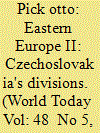

|
|
|
|
|
| Publication |
May 1992.
|
| Description |
83-85
|
|
|
|
|
|
|
|
|
|
|
|
|
|
|
|
| 11 |
ID:
119863
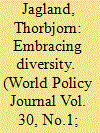

|
|
|
|
|
| Publication |
2013.
|
| Summary/Abstract |
Strasbourg, France-Any attempt to explain a transnational identity must take into account that nations, cultures, and people have always met and mixed across borders and boundaries. Europe's historically grounded diversity constitutes our true identity and gives us great strength if properly understood and respected. Over the centuries, nations have been born, and borders created or modified. The most recent wave of border changes occurred after the fall of communism. While some changes proved violent, such as war in the Balkans after the disintegration of Yugoslavia, others were peaceful. Czechoslovakia split, without conflict, into the Czech Republic and Slovakia.
|
|
|
|
|
|
|
|
|
|
|
|
|
|
|
|
| 12 |
ID:
034850
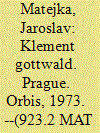

|
|
|
|
|
| Publication |
Prague, Orbis, 1973.
|
| Description |
103p.Hbk
|
|
|
|
|
|
|
|
|
|
|
|
Copies: C:1/I:0,R:0,Q:0
Circulation
| Accession# | Call# | Current Location | Status | Policy | Location |
| 013389 | 923.2/MAT 013389 | Main | On Shelf | General | |
|
|
|
|
| 13 |
ID:
139942
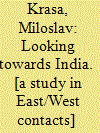

|
|
|
|
|
| Publication |
Czechoslovakia, Orbis Prague, 1969.
|
| Description |
158p.pbk
|
|
|
|
|
|
|
|
|
|
|
|
Copies: C:1/I:0,R:0,Q:0
Circulation
| Accession# | Call# | Current Location | Status | Policy | Location |
| 013044 | 954/KRA 013044 | Main | On Shelf | General | |
|
|
|
|
| 14 |
ID:
101057
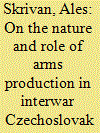

|
|
|
|
|
| Publication |
2010.
|
| Summary/Abstract |
Arms production in interwar Czechoslovakia has been a fascinating subject to research. The development of Czechoslovak weapons production was remarkably interesting as it was influenced by many political, military, and economic factors. The arms industry was obviously a particular branch that, together with arms exports, represented a matter that was also very politically delicate. In the 1930s, the rapid revitalization of the armament industry played an important role in the Czechoslovak economy. The armament boom helped the Czechoslovak economy to achieve better results and improved the situation in many branches of the Czechoslovak industry. However, high defense expenditures represented a rather dangerous phenomenon, with possible negative effects on the Czechoslovak economy in the long run.
|
|
|
|
|
|
|
|
|
|
|
|
|
|
|
|
| 15 |
ID:
096914
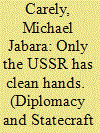

|
|
|
|
|
| Publication |
2010.
|
| Summary/Abstract |
The first part of this two part essay is a re-examination of the Czechoslovak crisis (1934-1938) based on papers from the Arkhiv vneshnei politiki Rossiiskoi Federatsii in Moscow. The essay is also grounded in British, French, and Romanian archives and the standard published collections, including the American and German series. It is about the development and conduct of Soviet collective security policy in the key years leading to the "Munich crisis" in September 1938. Evidence from the Moscow archives demonstrates that the Soviet government was serious about collective security and that it was ready to participate in an anti-Nazi alliance. Its initiatives were repeatedly rebuffed in Europe, notably in Paris and London. Even in Prague, the Czechoslovak president, Eduard Bene , was an undependable ally. These rebuffs led the Soviet government to be cautious during the Munich crisis. The Soviet Union would not act unilaterally, but what it actually did do was intended to defend Czechoslovak security within the constraints of Anglo-French abandonment in which Bene himself was complicit.
|
|
|
|
|
|
|
|
|
|
|
|
|
|
|
|
| 16 |
ID:
108016
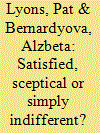

|
|
|
| 17 |
ID:
025533
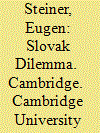

|
|
|
|
|
| Publication |
Cambridge, University Press, 1973.
|
| Description |
ix, 229p.Hbk
|
| Series |
International Studies
|
| Standard Number |
0521200504
|
|
|
|
|
|
|
|
|
|
|
|
Copies: C:1/I:0,R:0,Q:0
Circulation
| Accession# | Call# | Current Location | Status | Policy | Location |
| 011899 | 943.73/STE 011899 | Main | On Shelf | General | |
|
|
|
|
| 18 |
ID:
053782
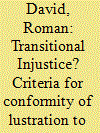

|
|
|
| 19 |
ID:
102956
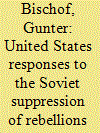

|
|
|
|
|
| Publication |
2011.
|
| Summary/Abstract |
Under Presidents Dwight Eisenhower and Lyndon Johnson, the United States refrained from intervening during the three major Cold War crises in the Soviet bloc in 1953, 1956, and 1968. The uprisings in the German Democratic Republic and Hungary came at a contentious stage of the Cold War. In 1968 East-West relations were again groping towards deacutetente and, the Czechoslovak Communist Party unleashed an ambitious reform agenda under Alexander Dubccaronek. On 20 August, a massive military invasion by Warsaw Pact forces squashed the reform spirit. All three challenges to Soviet control on the periphery of its Cold War empire followed power struggles in the Kremlin and intimations of a slackening of the reigns of control in Moscow. Eastern Europe was terra incognita for most Americans, and the United States had never pursued an active policy in Eastern Europe. All three crisis scenarios were overshadowed by crises in other parts of the world-part of larger arcs of crises the superpowers were confronting simultaneously. The three crises also coincided, domestically, with intense presidential election politics. Washington ultimately respected the Yalta arrangements and tolerated the Soviet sphere of influence in Eastern Europe. Next to grudging respect for the Yalta outcomes, the ultimate spectre of mutual destruction in a nuclear war "compelled" the superpowers towards co-existence and, ultimately, in 1989, the satellite states had to liberate themselves.
|
|
|
|
|
|
|
|
|
|
|
|
|
|
|
|
| 20 |
ID:
140143
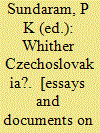

|
|
|
|
|
| Edition |
1st ed.
|
| Publication |
New Delhi, Dawn Publication, 1969.
|
| Description |
188p.hbk
|
|
|
|
|
|
|
|
|
|
|
|
Copies: C:1/I:0,R:0,Q:0
Circulation
| Accession# | Call# | Current Location | Status | Policy | Location |
| 009435 | 943.704/SUN 009435 | Main | On Shelf | General | |
|
|
|
|
|
|
|
|
|